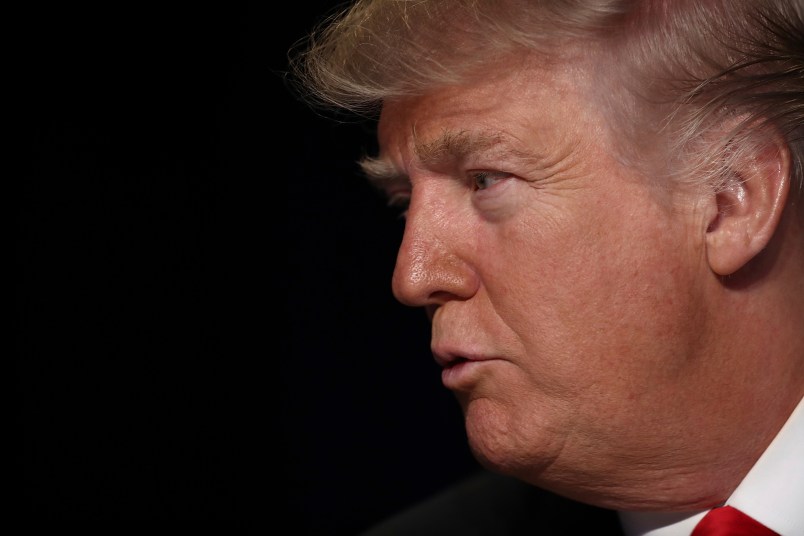When President Donald Trump jumped to his daughter’s defense and bashed Nordstrom for dropping Ivanka Trump’s clothing line, his tweet amounted to a misuse of office, ethics experts told TPM.
Larry Noble, general counsel at the Campaign Legal Center, told TPM that Trump’s tweet “is the cleanest example where there’s no question that he has brought the government weight to bear on a private business interest.”
“This was a clear example of him crossing the line where he used the power of the White House to basically defend a business his family owns, and that is wrong,” Noble said.
The move could open Trump up to legal action, the experts said. And by jumping to Trump’s defense and promoting Ivanka Trump’s line in a Fox News appearance Thursday morning, Kellyanne Conway likely broke a federal ethics regulation herself.
Jessica Levinson, a government ethics professor at Loyola Law School, told TPM that it constitutes a misuse of office every time Trump mentions one of his own products. She added that Trump’s Wednesday tweet directed at Nordstrom was “more of the same” from a President who refused to divest from his businesses.
“This is what a kleptocracy looks like,” Levinson told TPM.
Though the tweet may not have been hard to believe coming from Trump, his approach to potential conflicts of interest is unprecedented, according to Russell Riley, a presidential historian and professor at the University of Virginia’s Miller Center.
“I genuinely can’t think of anything that comes close to this particular intervention in relation to the question of conflicts of interest,” Riley told TPM. “President Trump isn’t calibrated in the way that his predecessors have been, where former Presidents have come into office and have seen while in office to be eminently careful about not doing anything that could be perceived as an impropriety.”
“I can’t recall any instances in the post-Watergate era, and that’s the time that I’m the most familiar with, where you would have seen a President doing things that would have benefited him directly financially,” Riley later added.
While Trump, as President, is not subject to the federal conflict of interest statute, attacking Nordstrom may open him up to some legal challenges. Levinson noted that some states have unfair competition laws that could allow a company to sue the President.
“What he’s doing is improperly infringing upon their ability to conduct business,” Levinson told TPM.
Riley also said Trump could be vulnerable to a legal challenge if Nordstrom believes the company was harmed by his tweet.
“I would imagine that the White House counsel probably had a fit when this happened,” Riley said, noting that Presidents are not immune from civil lawsuits.
“If the President makes these kinds of attacks a commonplace feature of his Oval Office or his White House behavior, he is creating for himself legal vulnerabilities that could get him tangled up during the entire course of his presidency because these lawsuits will be allowed to proceed,” he said.
It also appears that Conway broke a federal regulation in her Thursday morning interview on Fox News.
Noble, of the Campaign Legal Center, told TPM that he believes Conway violated an ethics regulation that stipulates “an employee shall not use his public office for his own private gain, for the endorsement of any product, service or enterprise, or for the private gain of friends, relatives, or persons with whom the employee is affiliated in a nongovernmental capacity.”
Richard Painter, who served as the chief ethics lawyer under George W. Bush, declined to provide an assessment of whether Conway’s actions were illegal. But he said that a federal employee who promotes a private business in an official capacity would break ethics regulations.
“It is a violation of federal ethics regulations prohibiting use of public office for private gain for any government employee in an official speech, an official capacity TV interview or any similar communication to promote the products or services of a particular private business belonging to the employee’s own family, the President’s family, a friend, a campaign contributor or anyone else,” he wrote in an email to TPM. “That was strictly forbidden in the Bush administration because it is illegal.”
White House Press Secretary Sean Spicer said on Thursday afternoon that Conway “had been counseled” after the incident, but he did not elaborate or indicate that she had been disciplined in any way.
Noble said that violations of the regulation would typically be handled at the department level. He added that the Office of Government Ethics can investigate incidents, but that OGE is not an enforcement agency (the federal ethics agency said as much on Twitter, noting that its website and phones had been flooded with contacts from concerned citizens). The Justice Department could also get involved, but Noble noted that “we don’t have any indication the White House sees this as a problem,” given that Trump came out swinging in defense of his daughter’s business.
Noble, a veteran of the Federal Election Commission, told TPM that these actions in the Trump White House are “really stress-testing our democracy and our ethics rules.”
“They’re doing things that there aren’t a lot of procedures necessarily in place for because we never expected this to happen,” he said.







And the cherry on top of this lovely sundae is that her brand has tanked utterly.
Micturition Man: Meh. What’s one more lawsuit?
No this is real and this could start adding up to bigger real things.
This is a true abuse of power - not a conflict.
So who will hold him accountable?
GOP: Hello, hello, anybody home?
This was a clear violation of the law by Trump’s chief Propagandist Kellyanne Conway. To paraphrase from Mitch regarding KellyAnne - She was warned. She was given an explanation. Nevertheless she persisted in violating the law. And McConnell and Ryan remained mute.